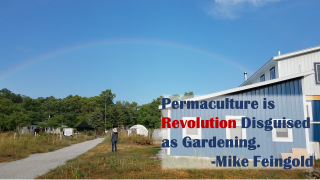A Traditional Ethics for a Sustainable Future

Photo copyright Renee Ruchotzke/UUA
We are living in a time of great change, where the forces of greed, selfishness, and fear have been unleashed and the future is unclear. We religious liberals can play an important role in influencing the conversation in a way that can shape the future with the counterforces of generosity, mutuality, and love. Unitarian Universalists have many partners in shaping our future, and we can learn a lot from one another to amplify our shared values and voices.
During my recent sabbatical (thanks to the generosity of our UUA and your Annual Program Fund gifts) I spent time doing a deep dive into Permaculture, which Mike Feingold described as “revolution disguised as gardening.” As part of that study I completed a two-week Permaculture Design Course with Peter Bane, Rhonda Baird and Keith Johnson at Blue Sky Farm. I’ll share more in future blogs but for now I want to talk about ethics.
We currently live in an a society based on ethics that condone exploitation of people and extraction from nature. Most aboriginal cultures and other traditional societies have ethics that are based on values that are in alignment with our notion of Beloved Community. Permaculture has adapted them into three (plus one) central ethical principles:
- Earth Care
This principle aligns with the UU seventh principle: Reverence for the interdependent web of all existence. In practice this means:- Being good stewards of the earth, from micro-organisms in the soil to the biodiversity of species, each one having intrinsic value.
- Increasing biodiversity is an imperative
- Humans, as part of the community of beings, should limit our impacts by doing no further harm, conserving and restoring what is left, and consuming without waste.
- People Care
This principle aligns with the UU first principle: Respect for the inherent worth and dignity of all people. In practice this means:- Our institutions should be human-centered, encouraging material and non-material well-being for all.
- Power should be decentralized and localized (such as in our congregational polity).
- Individuals in communities should be encouraged to take personal responsibility, initiative and practice self-reliance.
- Fair Share
This is the principle that is the key to the future, and is where the revolution shows up.
- We need to live in the spirit of mutuality, generosity and trust in one another and in nature’s abundance.
- We need to articulate and address the limits to growth, consumption and population.
- This will require a commitment to living simply and scaling back to sustainable economic principles based on the notion of the common good.
Transition-Aware (the plus one)
In the past, many permaculture practitioners did so outside of the mainstream culture. But this way of being in the world offers hope and a workable model for how humans can address climate change. But even if we have a workable solution, we can’t implement it until we know how to foster a paradigm shift among fellow humans.
One critique I have of Permaculture is that—although it’s based on principles that align with traditional societies—almost all of the leaders, authors and teachers have been white men born before 1955. There is a recognition among the rising leaders (as well as many of the elders themselves) that this grounding in “The Patrix” (White Male Supremacy culture) is something they need to address.
Rev. Renee Ruchotzke
CER Congregational Life Staff

